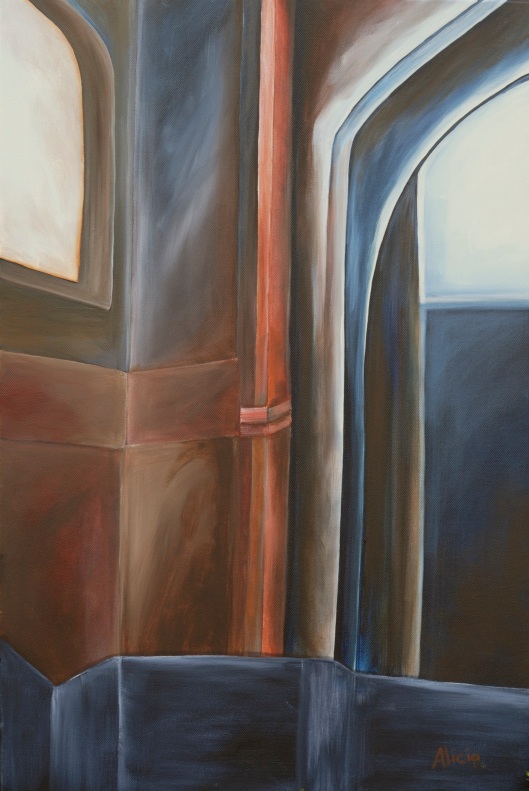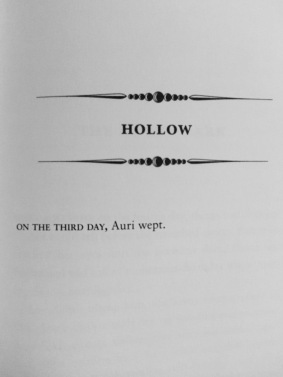Tags
Auri, Blandy, books, depression, joy, Kvothe, literature, Madeira, Malmsey, mental illness, Patrick Rothfuss, sadness, The Kingkiller Chronicle, wine

Cathedral by Alicia Giuffrida
Sometimes you meet a book at just the right time.
I have long been a fan of Patrick Rothfuss’ The Kingkiller Chronicle, a heroic fantasy series that tells the story of Kvothe, a man who has “talked to Gods, loved women, and written songs that make the minstrels weep.” This blog isn’t about him.
This blog is about Auri, whose story is told in The Slow Regard of Silent Things, a novella following the second Kingkiller installment.
Auri knows the way of the world, she knows the right and proper way of doing things. She knows better than to do what isn’t right. Auri is a young girl with more hair than physical substance; she is perhaps insane, perhaps OCD, perhaps lonely.
This is where I have to be honest with you: I thought figuring out what is wrong with her was the reason to read her story. But it’s not. I started out wondering, “Why does she wash her face and hands and feet so much? Why must she place everything just so? Do inanimate objects really speak to her?”
None of that matters.
I met Auri at the right time.
Depression is a weird thing to experience. Where does it come from? Why does it go away? Like most people, I get depressed sometimes. It’s like wading through a vat of cornstarch, heavy and viscous. And also not. That’s the problem. I can’t describe it and I can’t say why it comes or goes. I only know that when it’s here I resign myself to waiting it out and hoping it won’t be too long.
I picked up Auri’s story during just such a time, a waiting time. It didn’t make the depression go away but Rothfuss’ rhythmic, poetic prose struck a bell in my heart. A pure, tonal resonance that reverberated in my ribs.
Auri does everything a certain way so that she can remain in control of herself and her surroundings, she knows how fragile the world is, how fragile she is. She is broken, but she understands that broken is not shattered. She knows what a look entails, the graceful way to move, and the angry dark (those are all chapter titles, take a moment to enjoy the brilliance of them). More importantly, she knows that when all her carefulness doesn’t work and her world spins out of orbit that, eventually, something will set it to rights. Oftentimes it’s something that doesn’t make a particular kind of sense and that’s okay.
And I guess that’s what I needed. I needed to know that someone else had felt the earth tip sideways and panicked, that someone else surrendered a day to weeping because nothing else can be done on such a day. That’s a whole chapter, it doesn’t even have a page number. Just look at it for a second. It knocked the breath from my chest.

What is most striking about Auri is the persistent thread of joy that strings her days together. She lives in a hard world (don’t we all?) and the pieces of her life, the pieces of her, sometimes slip, but she knows that when it comes back together she should smile. That when something delightfully unexpected happens, she should laugh even if two minutes ago she never thought she could laugh again.
I don’t know if Auri is all of us, but she is at least part of me. Rothfuss himself admits to being self-conscious of this story, and I too am self-conscious of writing about it because I’m not sure if other people will understand Auri. Here is a character I instinctively wish to protect, she is precious and wise and I can’t stand the thought of anyone hurting her. She tries not to be selfish, she tries to be right, she trusts that she’ll survive, even when she isn’t sure how. I feel like her. I want things to be right, I want to be good; I want to be content and not wicked or greedy, as she might say.
I realize I’ve said very little about the story. Plot isn’t always the point, heretical as that may be. If you have read the Kingkiller books but shied from this short fiction because it isn’t the book you’re waiting for (yeah, yeah, we all want Book 3), shove that aside and read The Slow Regard of Silent Things. It matters. Auri matters. This is a small and enlightening adventure that left me so hollow and so full. You deserve to experience it too.
Mr. Rothfuss, I’m raising this toast to you. Thank you for writing something brave and quiet and needed. You were afraid this book wouldn’t be suitable for publication but I’m so glad Vi Hart and your agent and publisher assured you otherwise. I hope Auri will always remind me that I am right where I ought to be.
Today’s pairing is a Blandy’s Madeira 5 Year Old Malmsey:
Produced using rigorous traditions that date back hundreds of years, the sweetest Madeiras are made from the rich Malmsey grape. After vinification, the wine is aged in American oak casks in the traditional ‘Canteiro’ system. The wine is heated gently in a lodge and transferred over the years from the lofts, to the middle floor and finally to the ground floor. This gradual aging and cooling process is called estufagem and seems fittingly reminiscent of Auri’s travels through the Underthing.

Book illustration by Nate Taylor

Pingback: Art, Wine & Literature 2 | Alicia Giuffrida